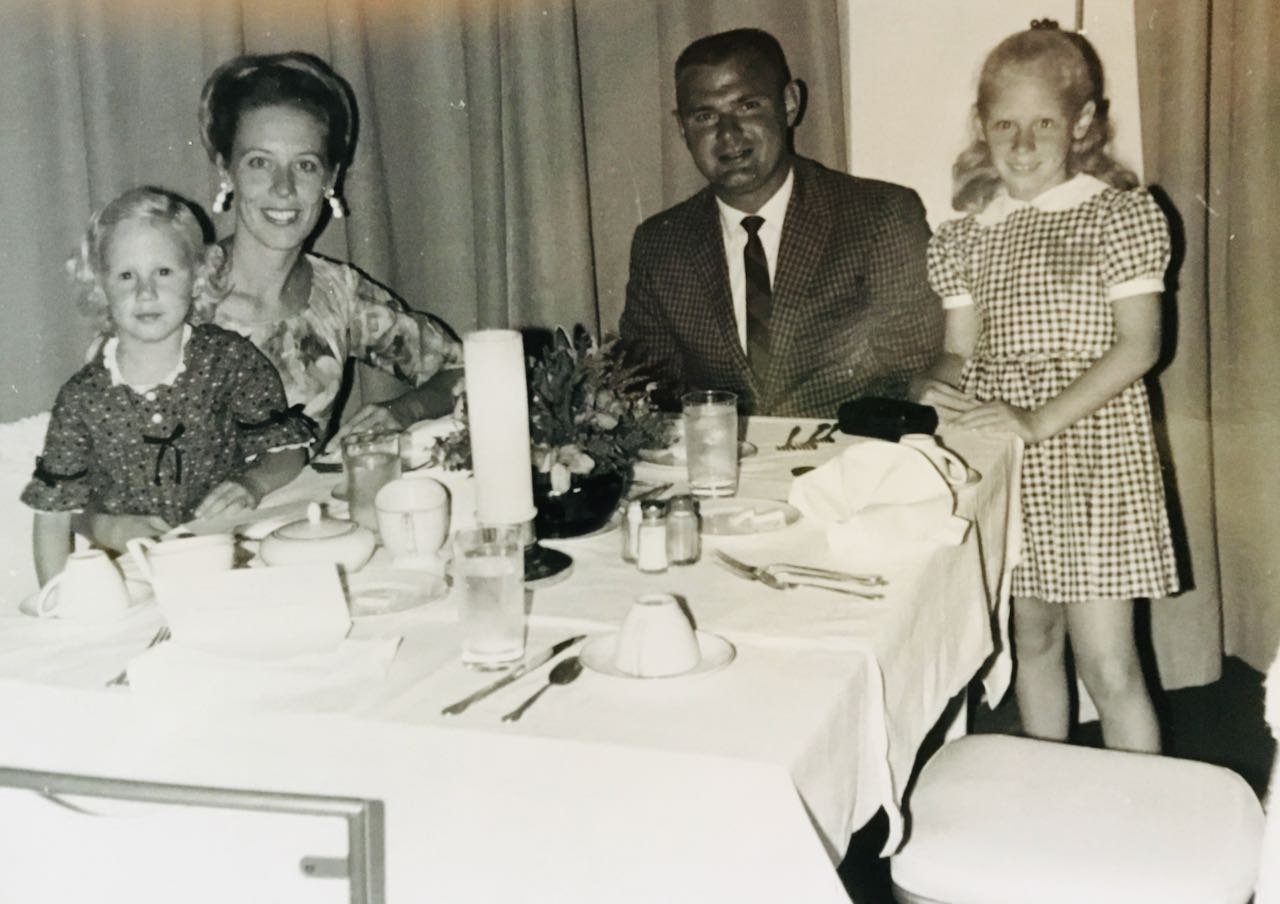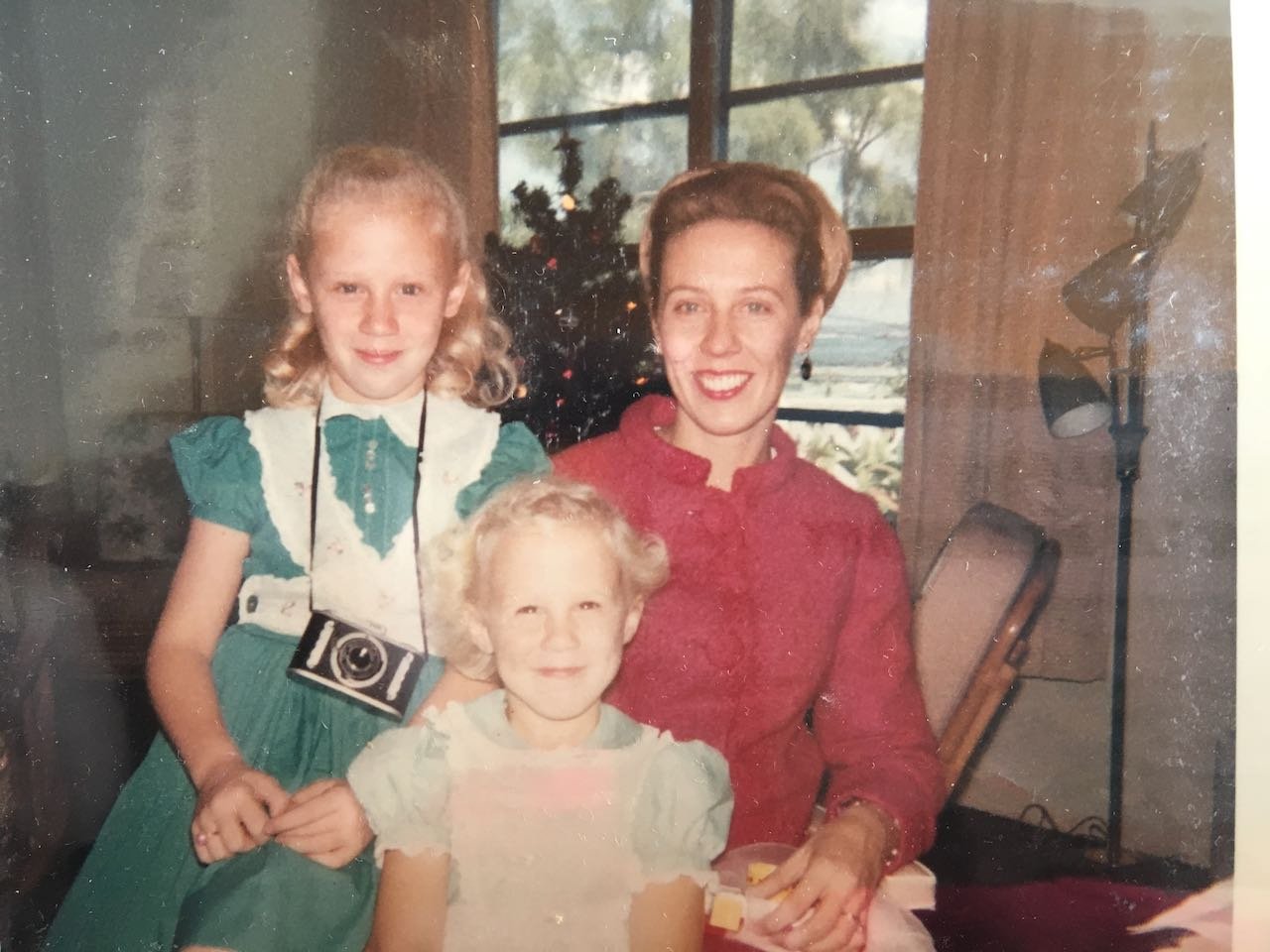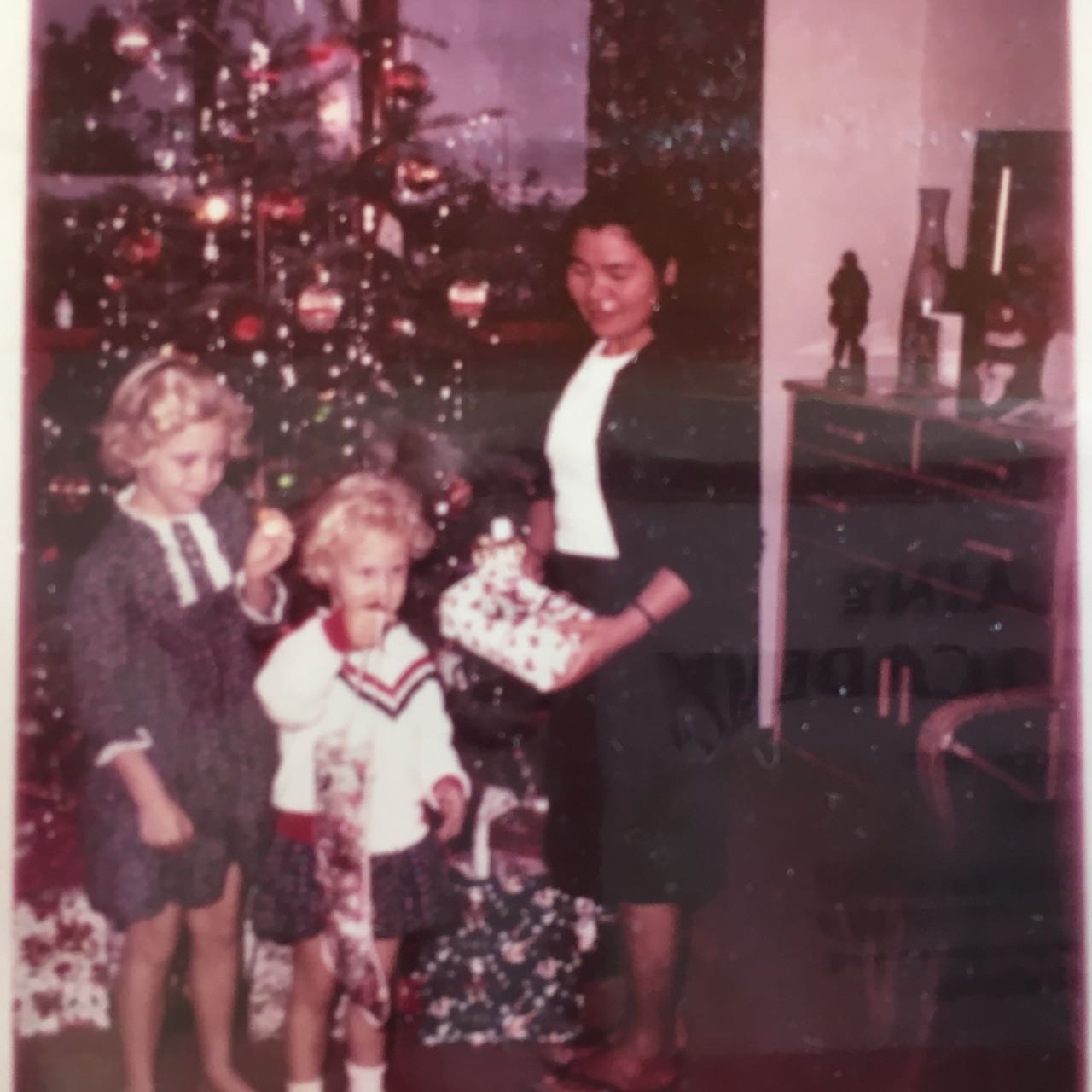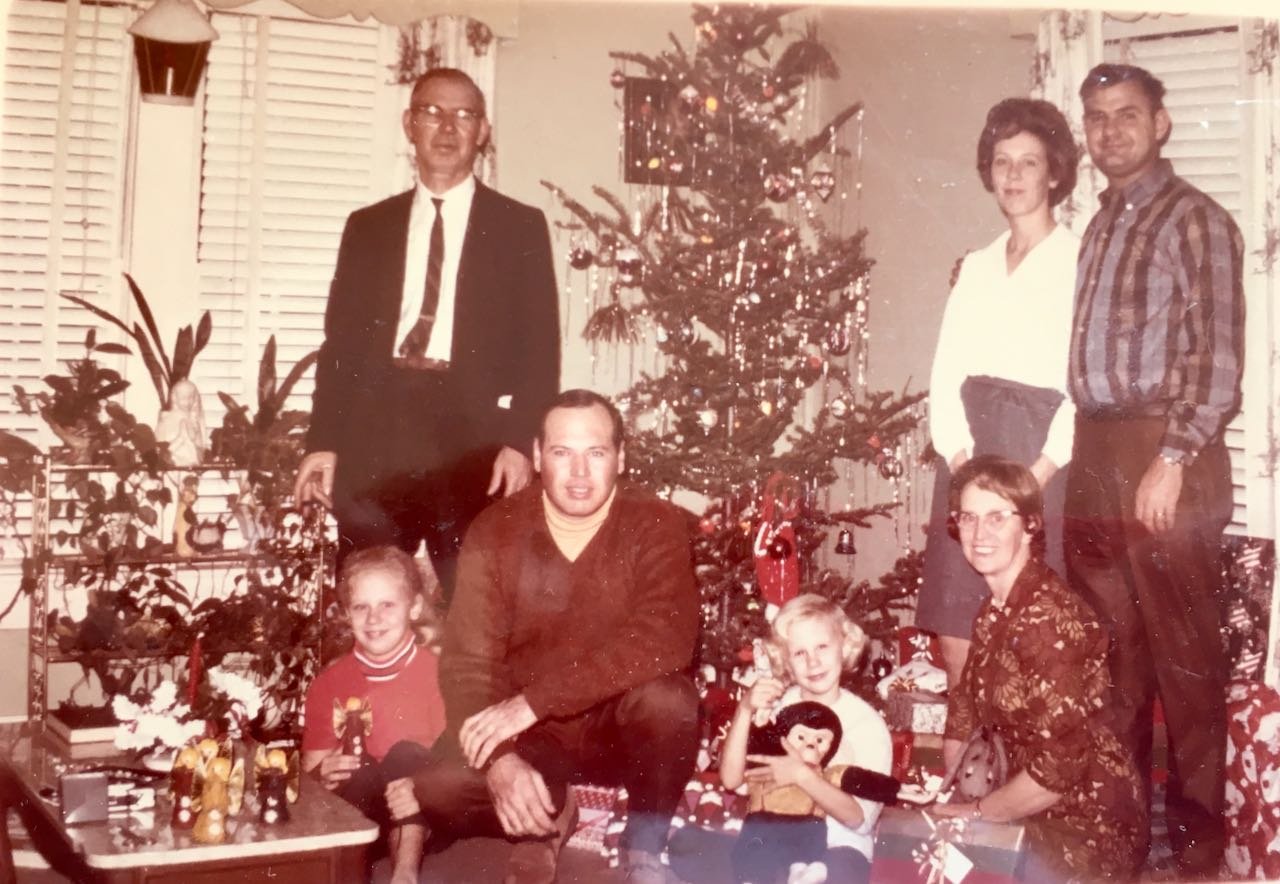Post #10 of 40
Giving Up My Imaginary Friends
My mother, barely 28 years old, boarded a plane with my sister, 5, and me, 2. It was 1966, and the Vietnam War was underway. We were on our way to Okinawa where my father, a C-130 pilot, had been living and working in anticipation of our arrival.
I only have a few memories before this time, and I consider our move to Okinawa the beginning of my memory making.
When we arrived, Daddy picked us up in a rusty, dark green car, and he drove us to a house on the top of a hill. The yard had poinsettias and trees, a flagpole, a stone wall, and a view of the ocean. I don’t remember the time of day, but I remember the inside of the house being dark. I found my way to a small table in the kitchen, and Daddy fixed a bowl of cereal for me.
We lived in Okinawa for two and a half years. My sister attended first and second grade and a few months of third grade. I stayed at home for a year with my mom and our maid, Shigekko. Then I attended nursery school and a few months of kindergarten in Quanset huts. Janet and I both had friends from school and from the neighborhood.
I can share detailed accounts of trips to the beach, to the local seamstress, to the Philippines, and to Tokyo and Kyoto. I can describe the cake my mother made and decorated to look like a carousel, complete with sculpted horse marshmallows, for her friend Ann, another pilot’s wife, who had a baby while we were there. I can tell you how my mom’s Dentyne gum smelled and how the hospital looked out of one eye when I got stitches beside my eyelid and in my eyebrow because of a bite from our dog.
One hot, summer day in 1968, my mom, sister, and I went to see the movie, Yours, Mine, and Ours. After the movie, Mama drove to the post office, picked up the mail, and slipped back in the car to read a letter from my dad, who was on assignment in Vietnam for three months at a time. After some silence, she took a deep breath and read one part aloud, “Save your money and pack your bags. We’re going home.” Even at the age of almost five, I knew this was significant, and that life was about to change.
I don’t remember the specifics of packing, but I know it was complex. I remember asking Janet whether we’d be taking the Datsun convertible with us. I cried when I found out it was staying behind.
As far as family in the United States went, I knew one set of grandparents and our uncle (still in the army at the time) because they had visited us in Okinawa. I didn’t remember any other relatives and didn’t even know what extended family was. I didn’t know that my father had multiple siblings, that I had another set of grandparents, that I had cousins my own age on my father’s side. I’m sure I was told about them and shown pictures, but I didn’t remember them. I was leaving behind everyone and everything I remembered, except for the six people who had been with me or visited in Okinawa, and I was entering into a community I didn’t know.
Once our house was packed up, we moved to another military-furnished house for a few days, sort of a holding spot for us until time for our flights. One day I sat under a table as the island sun shone in the window on me. In that moment, I began inventing a friend to come with me to the States. His name was Rumple, and he was short, perhaps a dwarf. He had the wisdom and skills of a grownup, but he was my height, so I could look him in the eye. Rumple was a born leader. He knew the right thing to say and do at all times, and he was generous with his advice for me.
Rumple needed a friend by day two, and I invented Peter. Peter was also my height, and he was a grownup, a slightly less mature one, I suppose, never naughty, though. Peter’s hugs were the best. He was humorous and loving, and he was a perfect companion for Rumple and me.
In the book Imaginary Companions and the Children Who Create Them, the author says that children who feel lonely find companionship in imaginary friends. The loneliness that is helped by companions is rarely the kind in which a child’s friends happen to be busy on occasion. It is a bigger kind of loneliness that she describes.
Perhaps it is the loneliness being felt or anticipated by a five year old leaving everything she knows.
My imaginary friends traveled with me across the ocean all the way to Nashville, where we lived for six weeks with my maternal grandparents. Rumple and Peter were quiet during those times, and I hardly thought about them. While I am sure it was hard on the grownups all living in a small house with one bathroom, I was in heaven having my mother and grandmother to myself all day as well as having another set of grandparents and my great-grandparents, all on the same street.
During the snowy days of January 1969, our family of four moved to a ranch house on the lake in Hendersonville, Tennessee, about a thirty minute drive from Saunders Road, where all the grandparents lived.
When we moved to Hendersonville, Janet continued in third grade at a local school, but no kindergartens had available spots for me, so I stayed home with my mother the rest of the school year. Rumple and Peter began to visit again, and I enjoyed their company. There were no children in the neighborhood, so they were my playmates.
Within the next months, Rumple and Peter had invited five more friends to join us. Their names were Lelom, Ayay, Coco and Goshy and Gogy, who were twins. I am sure it is no coincidence that I ended up with seven friends since I was a fan of Snow White and the Seven Dwarfs and listened to the record as often as I could.
In the fall of 1969, I started first grade and found friends who were real, not imaginary. I remember telling Monica, a real friend, about my seven imaginary friends, and she had no interest in playing with them. Eventually I met Cheryl in the neighborhood, and we would watch the Monkees on Saturday morning and eat toast with grape jelly that her cat-eyed mom prepared. Real friends continued making appearances, and I gave up Rumple, Peter, and their friends.
I gave up my imaginary friends in order to have more time and more fun with real people. I had always known they were imaginary. I also knew I could invite them back at any time.
———————-
I understand that elderly folks - living with dementia perhaps - sometimes see figures from their childhood. When I am old and frail, and my mind is slipping, I hope Rumple and Peter visit me. I’ll make sure to have two chairs ready for them. I am not sure we’ll have enough room for the other five.















